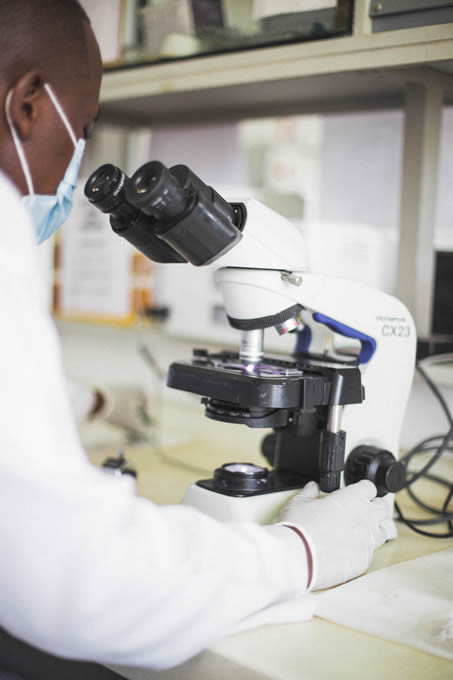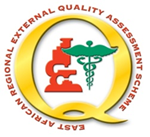The East African Regional External Quality Assessment Scheme (EA-REQAS) is an accredited, integrated laboratory Proficiency Testing (PT) scheme focusing on tests commonly performed in peripheral level health facilities.
EA-REQAS serves public, private and faith-based health facilities. The overall goal of the scheme is to promote quality laboratory diagnostic services, improved patient care, and the prevention and control of diseases of public health importance across national health networks.
The scheme submits seven (7) different panel materials twice a year. Accompanying questions address laboratory, clinical and public health issues to promote communication and understanding between all health facility cadres. Participation costs USD 200 per year for two (2) surveys. Immediate Feedback Reports provide a rapid evaluation of performance, and Composite Reports after each survey detail results across all countries to enable facilities to benchmark their performance against other participating laboratories.
Brief timeline of EA-REQAS development
2000
Inception
The Ministries of Health of Kenya, Mainland Tanzania, Zanzibar and Uganda, with support from WHO, planned to develop and implement an East African Regional External Quality Assessment Scheme (EA-REQAS) to improve the quality of essential diagnostic services in peripheral health facilities in East Africa
2000
2003
Establishment
A regional meeting was held in Arusha, Tanzania, with representatives from medical laboratory authorities, professional clinical and laboratory bodies, health laboratory boards and councils, research institutes, and private institutions. Resolutions were drawn up to establish an East African Regional Quality Assurance Committee (EA-REQAC) to oversee the scheme
2006
Scheme design
The first EA-REQAC meeting was held in Zanzibar. Discussions included frequency of surveys, critical tests to be assessed, selection of reference laboratories to supply proficiency testing materials, and development of Standard Operating Procedures for material preparation
2006
2009
Review & Implementation
The second EA-REQAC meeting was held in Kampala, Uganda, to review scheme activities and participating laboratory performance. Discussions also included modalities for expansion of the scheme within existing countries and to other member states of the East African Community (Rwanda and Burundi).
2010
End of Pilot Phase
The third EA-REQAC meeting was held in Nairobi, Kenya, marking the end of the pilot phase targeting 200 health facilities. The pilot phase was supported by WHO and Izumi Foundation. Discussions included challenges faced during the pilot phase and progress of the scheme.
2010
2011 to date
International accreditation
EA-REQAS has continued to distribute 2 proficiency testing surveys per year. EA-REQAS achieved accreditation to the ISO 17043 standard as a proficiency testing provider in 2021. This marked a major milestone.
 In 2000, the Ministries of Health of Kenya, Mainland Tanzania, Zanzibar and Uganda, with support from the World Health Organization Headquarters, established a pilot project to develop and implement the East African Regional External Quality Assessment Scheme (EA-REQAS) with the overall goal of improving the quality of essential diagnostic services in peripheral health facilities. The focus of EA-REQAS was to involve national and local administrations in the coordination and implementation of the scheme, and to share resources and experiences across the three countries.
In 2000, the Ministries of Health of Kenya, Mainland Tanzania, Zanzibar and Uganda, with support from the World Health Organization Headquarters, established a pilot project to develop and implement the East African Regional External Quality Assessment Scheme (EA-REQAS) with the overall goal of improving the quality of essential diagnostic services in peripheral health facilities. The focus of EA-REQAS was to involve national and local administrations in the coordination and implementation of the scheme, and to share resources and experiences across the three countries.
A regional meeting was held in Arusha, Tanzania, in 2003, with representatives from the medical laboratory authorities, professional clinical and laboratory bodies, health laboratory boards and councils, research institutes, and private institutions. Resolutions and recommendations were drawn up addressing sharing of laboratory standards and materials, developing standard documents for both clinicians and laboratory staff, establishing or strengthening National Quality Assurance bodies, and forming an East African Regional Quality Assurance Committee. Amref Health Africa was appointed the Regional Coordinating Centre for the project.
At the first meeting of the Regional Quality Assurance Committee held in Zanzibar in 2006, the frequency of scheme surveys, critical tests to be assessed, selection of reference laboratories from each participating Ministry to supply proficiency testing materials, and development of Standard Operating Procedures for material preparation were agreed. Selected tests included thick blood films for parasites, thin blood films for blood cell morphology, stool and urine examination for parasites, Gram staining, Ziehl Neelsen staining, serology, and haemoglobin measurement. The Regional Coordinating Centre was assigned to prepare questionnaires, package materials for participating laboratories, mark the responses and prepare reports. Questions were designed to assess laboratory technical expertise, and measure the level of cooperation and interaction between clinical, laboratory and public health staff. The pilot scheme targeted a total of 200 facilities within selected districts in each country. Sensitisation workshops were held with district clinical and laboratory supervisors to aid the successful implementation of the pilot project by emphasising their vital role in carrying out remedial activities as needed.
The second meeting of the Regional Quality Assurance Committee was held in Kampala, Uganda, in February 2009, to review scheme activities and participating laboratory performance, and chart the way forward including modalities for expansion of the scheme within existing countries and to other member states of the East African Community (Rwanda and Burundi).
The third meeting of the Regional Quality Assurance Committee, held in Nairobi, Kenya in March 2010, marked the end of the pilot phase of the scheme. The meeting aimed to discuss the progress of the scheme and review challenges. The pilot phase of the scheme was supported by the World Health Organization Headquarters and the Izumi Foundation, USA.
Since then, EA-REQAS has continued to provide two surveys each year without interruption, coordinated centrally by the Regional Coordinating Centre at Amref Health Africa in Kenya with support from Country Coordinating Centres at the Amref offices in Tanzania and Uganda. In 2021, EA-REQAS achieved the major milestone of accreditation to the ISO 17043 standard as a proficiency testing provider. The aims of EA-REQAS to provide an integrated proficiency testing scheme addressing the most commonly performed laboratory tests

